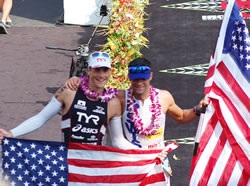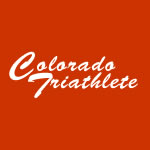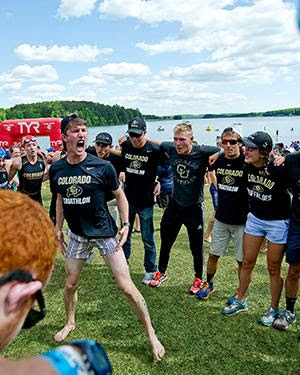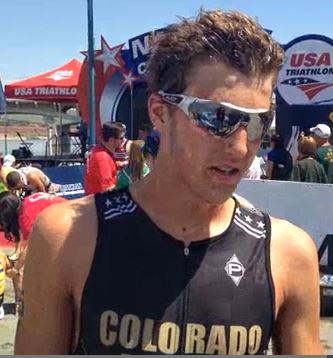By Adam Hodges
ISSUE #10, April/May 2001 – Last September, the sport of triathlon debuted at the Sydney Olympics with resounding success and the increased spotlight on the sport can’t help but carry over to the collegiate level. The University of Colorado triathlon team, owner of six collegiate national team championships since 1994, is once again prepared to defend their title at the Wildflower Triathlon in central California on May 6-a race with a 1.5K swim, 40K bike, and 10K run.
Despite its status as a club sport and lack of scholarships, the team has drawn a wealth of young talent looking to hone their triathlon skills. If you’re a young triathlete with Olympic dreams, the University of Colorado has become an appealing place to spend four years studying and training. CU’s previous success and reputation has built upon itself.
Beth Anderson, who claimed the women’s individual championship and a Wildflower course record last year, will be missing from this year’s contingent. Even though she is still in school, Anderson has graduated to the pro ranks and will be competing in the Wildflower long-course triathlon as a professional.
“Regrettably, we lost our top three men and top three women from previous years either to graduation, turning pro or the overlapping final exams,” said new head coach Bettina Younge.
Yet despite no returning scorers, Younge said, “Our men’s team may even be stronger than it has been in previous years. We have an incredible pool of talented athletes who are strong in all three disciplines.”
Two of those athletes are Blake Ottersberg and Lance Panigutti, both freshmen who joined the team this year. Ottersberg has been a member of the junior national triathlon team the past three years and claimed the title of junior national champion in 1998. He has raced in two world championships and recently competed in the Pan Am triathlon championships. His main goal this year is to again qualify for the junior elite national team-the junior elite team competes in draft-legal, Olympic style races versus the standard age-group, non-drafting format.
“My main focus is qualifying for the Olympics,” said Ottersberg. And an important step along that road is developing his skills on the national team. A week before Wildflower, he will be racing at the St. Anthony’s triathlon in Florida in hopes of earning a spot to this year’s world championships in Edmonton, Canada in July. Then he will fly back to Boulder, take some finals, and fly out to California for the collegiate championships.
As for his goals at the collegiate championships, Ottersberg said, “My goals for Wildflower are to place in the top three.”
And pushing him toward a podium spot at Wildflower will be Lance Panigutti. Panigutti, who is also looking for a spot on the junior elite national team this year, claimed a 48th place finish at the 1999 world age-group championships in Montreal and 25th at last year’s world age-group championships in Perth, Australia. Panigutti is shooting for a top ten finish at Wildflower and recently spent his spring break at a national team training camp in San Diego. “It was a great week of training under some great coaches,” said Panigutti.
According to team member and assistant cycling coach Ryan Ignatz, “The men’s team is stacked with a number of guys who have a shot at breaking into the top ten.” Ignatz, who qualified for the world duathlon championships a few years ago, hopes to be one of them.
Sophomore Tim Smith also hopes to be one of the scorers for the team at Wildflower. The top three finishers in both the men’s and women’s division count toward the team’s total time. It is this total team time that determines which school walks away with the title. Smith also lends credence to the draw that the CU triathlon program has on young triathletes moving on to college. “When deciding on colleges, I realized I did not want to limit myself only to running and chose CU for the beautiful setting to train,” said Smith. And that setting includes a plethora of training partners, coaches, and facilities.
Other men to watch at Wildflower will be Andy Feeney, Lucas Llado, Armando Galarraga, Bryan Taylor, Keith Jackson, Kai Costanzo, Jef Cormack, Bill Baker, and Jose Garcia.
“The women’s team is not as deep as it usually is, but we will have a few women that will be ready to go come race day,” said Ignatz. Watch for Kerrie Wlad and Erin Huck to lead a list of female Buffs that also include Amber Hofsted, Megan Clute, Julie Durhan, and Molly Rusch.
In all, 76 athletes will be competing in the collegiate championships for CU; and another 12 will be racing in the long-course race, including some as pros.
“Our biggest competitor and rival will be Cal Poly which is returning with a strong men’s and women’s contingent this year,” said Younge.
And ironically, the new coach of the always-tough Cal Poly team is Rick Ellison, the former CU triathlon team coach who helped inspire the phenomenal growth in the program. Ellison came on as CU’s coach in the fall of 1994 and guided the team to three national championships before he left after the 1998 season to take an administrative job at Cal Poly.
“He’s a great guy and a very inspiring coach,” said Ignatz, who competed on one of Ellison’s teams.
If Ellison has the same effect on the Cal Poly program, then CU may finally be given a run for their money at future championships; although it would take more than an upset to knock off CU’s attraction as the top development school for future pro triathletes and Olympians.
The CU triathlon team will be warming up for collegiate nationals by sending 24 members to the southwest regional collegiate championships at the Rocky Point Triathlon in Puerto Peñasco, Mexico on April 21.







